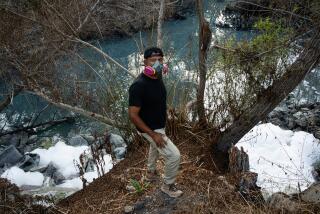Rio Grande of Jamaica is victim of greed
When 91-year-old Colin Lloyd Harris was young in these mist-shrouded mountains, the rushing waters of the Rio Grande sparkled with life. Plentiful shrimp, crawfish and striped mullets were culled with spears or wooden fishing pots.
Today the mighty river is being contaminated by people who dump pesticides into secluded springs for a quick and easy harvest, no matter what the cost to the environment or to those who eat the poisoned catch.
“There used to be so many fish here. Now, sadly, it seems there are few left,” said Harris, retired leader of a community of Maroons, descendants of escaped slaves who won their freedom by repelling invasions of their retreats with a mastery of guerrilla warfare.
Poison fishing in Jamaica’s wild eastern mountains has flourished in recent years because of the great demand for freshwater shrimp and janga, the common name for a delectable lobster-sized crawfish that fetches high prices in local markets. Often, buyers don’t ask the origin.
Limited oversight of the 200,000-acre national park that comprises much of the terrain makes it vulnerable to flagrant violations of environmental laws, including the sporadic use of dynamite to send river creatures belly up, said Rudolph Poyser, one of only five rangers.
“We know there is a lot of illegal activity, but we’re outnumbered,” Poyser said at the end of a workday in the tiny mountain enclave of Millbank, as the soft piping of insects filled the dense tropical forest.
When readily available pesticide or bleach is dumped into a pool, twitching fish immediately float to the top and crawfish jump onto the banks, Nature Conservancy scientist Kimberly John said. The poisons drift downstream, sickening people and animals who drink the water.
John, who is leading a bid to eliminate poison fishing through community education and intensified enforcement, said the destructive practice is driven by a steady decline in agricultural profits, along with the heavy demand for native shellfish.
A key challenge is to figure out how inhabitants of the economically poor region can get ahead without killing the Rio Grande, which they depend on for their livelihoods. The stakes are high.
“This is the greatest river in Jamaica. It’s full of history, full of wildlife, and if we don’t succeed in taking active steps to save it, we’ll lose it. It will be an empty channel,” said John, who argues that more must be done to generate economic opportunities for villagers.
The leader of a local conservation group, Vincent Fuller, said he and other townspeople in the sparsely populated mountains are angry that a few greedy neighbors are contaminating their beloved river. Villagers gossip about who they think is responsible.
“The community is getting very tired, people are crying out for this to end. It may come to vigilante justice if the hunters keep up with the poisoning,” Fuller said along the rutted road that winds alongside the Rio Grande.
Jamaicans who have been sickened by eating fish and shrimp poisoned with chemicals say the pain is excruciating. “My stomach, I can’t even tell you what it felt like. I couldn’t walk, I was in bed in great pain for many days and I itched hard all over,” said Robert Wilson, a 71-year-old farmer who said he nearly went broke buying medicines.
It wasn’t hard for Wilson and his doctor to figure out how he got sick. He doubled over last year after eating janga he had bought from two passing fishermen.
Arrests of poisoners are rare in the Blue and John Crow Mountains, police say. A local fisherman who catered to the lively trade in poisoned shellfish for a decade said he was lured easy money. He said he stopped after he was caught twice.
“I knew when I was doing it that it was not a good way, but I wanted the money,” said Carlton Walker, 43, offering a sheepish shrug.
The current leader of the Maroon community of Moore Town, Col. Wallace Sterling, said it saddens him that river poisoning is altering the fishing traditions of his proud West African ancestors who defeated the British army centuries ago. He said that a long fishing ban must be enforced for the entire Rio Grande Valley.
“People no longer depend on fishing for putting a meal on their table, but commercialization of fishing has brought out some people’s greed,” Sterling said in the town of modest frame houses on tree-lined acres. “We need time to recognize again that we should not reap more from the river than what we should be reaping.”
More to Read
Sign up for Essential California
The most important California stories and recommendations in your inbox every morning.
You may occasionally receive promotional content from the Los Angeles Times.










